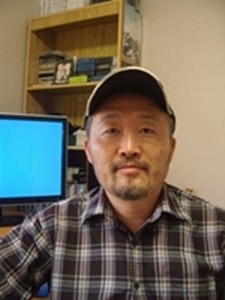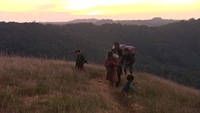Wellang Trei
2012
Special invitation 2
KIM Tae-il | 2012 | Documentary | Color | HD | 80min
SYNOPSIS
Trei and his wife Siley live with his parents and five children. The entire family depends on subsistence rice farming for livelihood. But the crop yields drop every year. Hoping to afford to buy rice, they plant Dum Long (cassava). Due to unusually hot weather, however, Dum Long rots rapidly and the price went down. “Why the hard working is no guarantee of self-subsistence?” The Treis haven’t found any answers on that question. Outsiders keep hijacking Bunong land of Mondulkiri and the indigenous people are losing their homes. Nevertheless, Siley doesn’t give up growing rice and starts again planting rice in the fields.
DIRECTING INTENTION
Mondulkiri is surrounded by jungle forest bordering Vietnam. In the past, colonialism and civil wars devastated the area. And now, invisible capital turns lives of the Bunong indigenous people in Mondulkiri upside down. I want to hear their stories told through their own voice ― how this economic invasion has affected their pride and independence. Through the eyes of the Threi family, I hope we can reflect on this change disrupting the traditional Bunong way of life.
FESTIVAL & AWARDS
2012 제17회 부산국제영화제 비프메세나 특별언급
DIRECTOR

KIM Tae-il
Special Song of Wonjin Factory (1993, 8mm, 38min)
People who Crossed the Border (1995, 85min)
A Purple Handkerchief (1995, Beta, 48min)
Grass Is Always Green (1996, DV, 58min)
Making the Spy (1998, DV, 50min)
9th April (2000, DV, 25min)
The Story of Korean Informal Women Workers (2003, 30min)
Wakling for Life (2004, DV, 74min)
Annyong, Sayonara (2005, DV, 107min)
Pharmacy for Peasant (2008, DV, 43min)
Worker Meets Worker (2009, DV, 38min 30sec)
No Name Stars (2010, HD, 101min)
STAFF
Director KIM Tae-il
Production Sanggune
Assistant Camera KIM Sang-gu
Assistant Director JU Romi
Cast Bunong race Trei family
PROGRAM NOTE
<웰랑 뜨레이>는 <오월愛>에 이어 ‘민중의 세계사’ 두 번째 프로젝트로 기획되었다. 김태일 감독과 아내 주로미, 상구와 송이. 네 가족들(상구네)은 모두 영화의 스태프가 되어 캄보디아 민중을 찍기 위해 캄보디아의 오지 몬둘끼리로 떠난다. 그러나 영화는 예상과 다르게 전쟁의 고통으로 얼룩진 캄보디아의 역사를 토대로 하지 않는다. ‘상구네’는 무모할 정도로 대책 없이 언어도 통하지 않고, 생활문화도 낯선 곳에서 영화의 주인공을 찾는다. 오랜 기다림 끝에 ‘부농족’ 뜨레이 가족을 만난다. 그들을 찍으면서도 뜨레이 가족이 주인공이 될 수 있을지 고민하는 상구네. 이것은 거대한 우연일까? 뜨레이 가족은 이방인에 대한 경계심이 있지만 친절하게 상구네를 대하고, 상구네 역시 육체적인 고통을 감내하면서 뜨레이 가족과 서서히 가까워진다. 농사일을 하는 뜨레이 가족을 돕고 낯선 문화를 체득해 가면서 <체험 삶의 현장>의 한 장면처럼 이질적인 두 가족의 이야기가 펼쳐진다. 변화의 소용돌이 속에 있지만 묵묵히 전통적인 방식을 고수하면서 농사를 지으며 살고 있는 9명의 뜨레이 가족들. 영화는 캄보디아의 역사 속에 한 가족을 위치 짓지 않고, 그들의 현재적 삶 속에서 캄보디아의 역사와 현재를 조망한다. 두 가족은 정말 우연하게 조우했지만, 서로의 삶을 존중하는 태도로 만나 마음을 터놓을 수 있게 됐다. 외지인들에게 팔려 나가는 부땅 마을의 토지. 고된 노동에도 불구하고 자급자족조차 할 수 없는 현실. 한 가족의 삶을 통해 들여다보는 캄보디아 민중들의 삶. <웰랑 뜨레이>는 그렇게 삶의 모습 속에 한편으로는 전통의 삶을 고수하며 땀 흘리며 살고 있는 사람들의 모습과 한편으로는 그들의 노동과 문화가 무색하게 변해 가는 제3세계의 현실을 보여 준다. 상구네의 고된 체험을 통해 그 현실을 들여다볼 수 있었다는 점 또한 중요하게 느껴진다.
조영각/서울독립영화제2012 집행위원장
